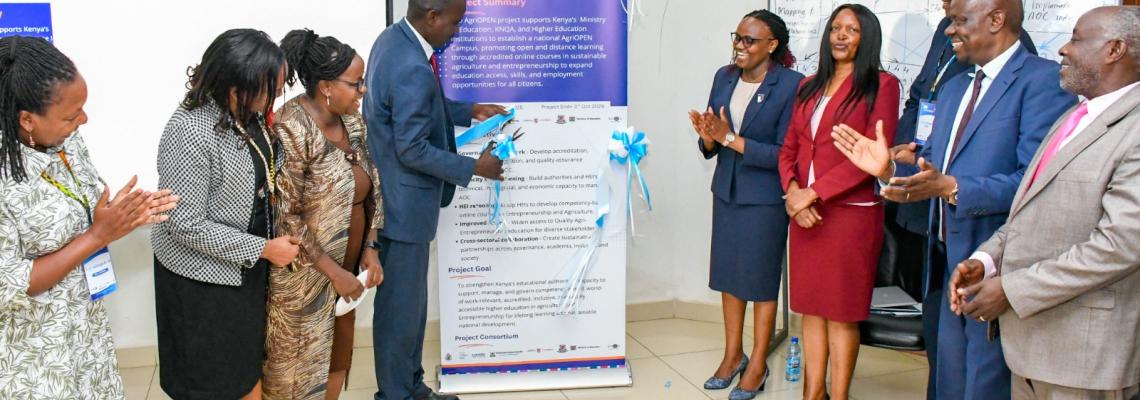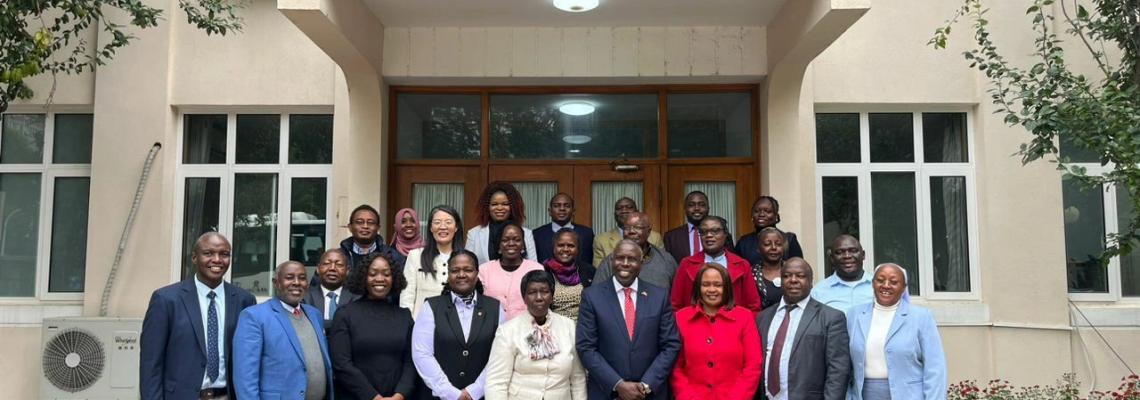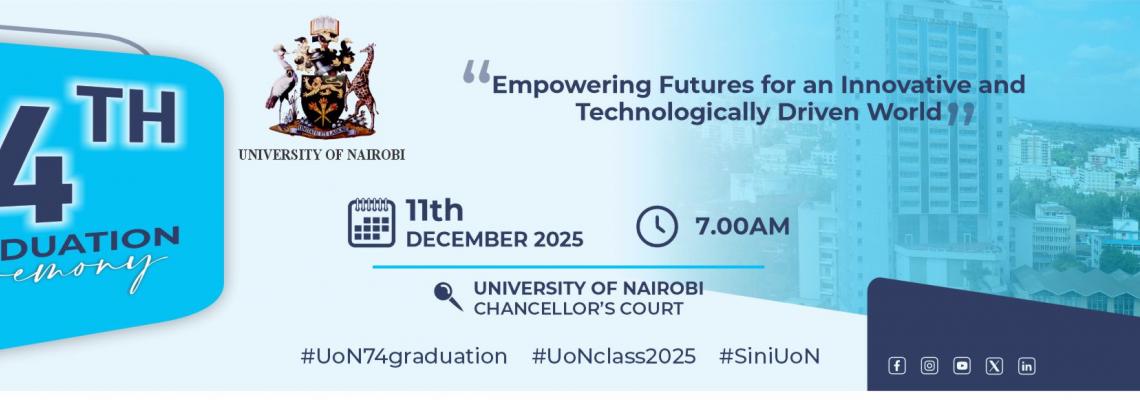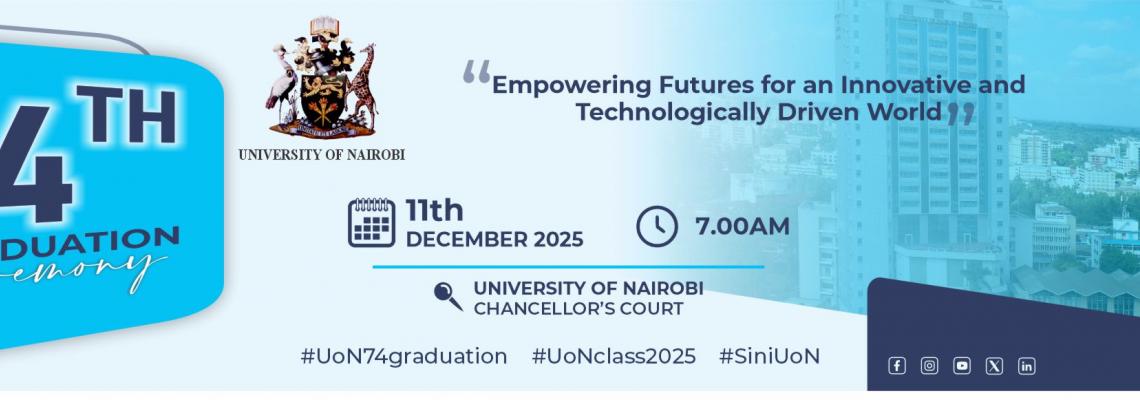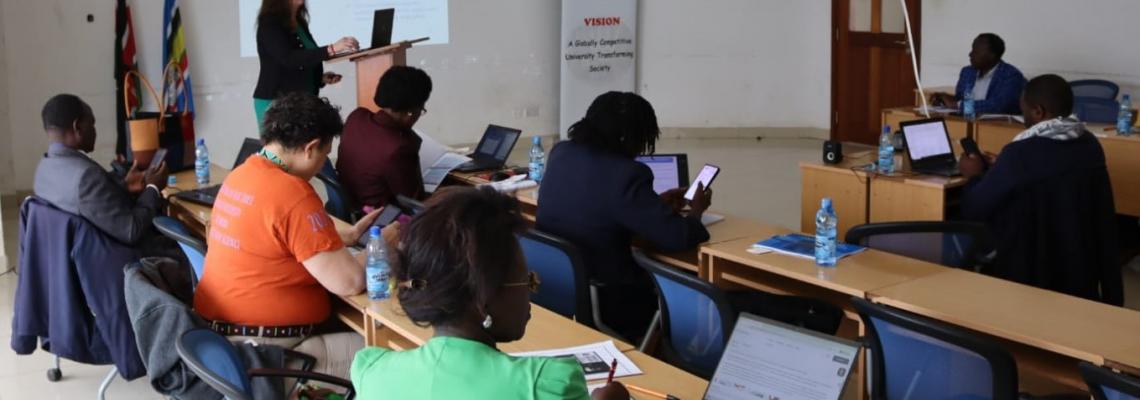UNIVERSITY OF NAIROBI RESEARCH WEEK CORPORATE THEME: ADVANCING RESEARCH AND INNOVATION FROM DISCOVERY TO IMPACT IN A DYNAMIC GLOBAL LANDSCAPE
DEPARTMENT OF EDUCATIONAL FOUNDATIONS SYMPOSIUM THEME: HARMONIZING CLIMATE CHANGE, ECOSYSTEM AND ARTIFICIAL INTELLIGENCE IN EDUCATION
DATES: OCTOBER 22 & 23, 2025
Call for Papers
The Department of Educational Foundations, Faculty of Education, University of Nairobi (UoN), Kenya, is delighted to announce an annual academic Symposium on the theme: “Harmonizing Climate Change, Ecosystem and Artificial Intelligence in Education.” We wish to invite educators, researchers, policymakers, graduate students and other community stakeholders to contribute papers that explore novel approaches to integrate diverse perspectives of the proposed theme into educational curricula. The aim of the symposium is to foster dialogue, share research findings, policy, pedagogical ideas and practices that will restructure the curricula to accommodate the influence of the questions related climate change, ecosystem and artificial intelligence in higher education.
Symposium Details:
- Dates: October 22 & 23, 2025
- Venue: Faculty of Education, University of Nairobi, Kenya
- Mode: Online
Instructions to Authors:
- Submit an abstract of 250 – 300 words using the APA style in any of the following themes on or before September 15, 2025.
- Notification of acceptance of abstracts - September 30, 2025.
- Submission of full paper and PPTs presentations - October 15, 2025.
Submission Thematic Tracks:
Track 1: History of Education
- Tracing the development of artificial intelligence in the history of education curricula.
- Analyzing the evolution of pedagogical strategies aligned to climatic changes, ecosystem, and artificial intelligence in different historical periods.
- Investigating how historical shifts in technology have influenced the dissemination of climate and ecosystem knowledge in educational settings during the era of artificial intelligence.
- Examining the historical integration of AI and ICT in higher education institutions and its effect on fostering responsible attitudes among the lecturers and learners.
- Exploring the historical trajectory of applying technological and artificial intelligence solutions in historical contexts of education to address climate change and ecosystem preservation.
- Analyzing the ethical and policy debates surrounding the use of artificial intelligence in education from a historical perspective.
- Investigating how educational institutions historically adapted to the challenges and opportunities presented by emerging technologies such as artificial intelligence.
Track 2: Philosophy of Education
- An ethical consideration of artificial intelligence in higher education initiatives through interdisciplinary learning.
- A philosophical implication of integrating artificial intelligence for conservational education and ecological harmony.
- Analyzing the energy consumption and carbon footprint of artificial intelligence infrastructure in higher education.
- Mitigating potential biasness emanating from artificial intelligence algorithms and applications in data security and privacy in educational theory, policy, and practice in higher education.
- A philosophical integration of critical and creative thinking against the influence of artificial intelligence in higher education theory, policy, and practice.
- The philosophy of education would critically examine the ethical frameworks for applying AI in educational settings with a focus on environmental justice and equity.
- Exploring how traditional philosophical perspectives, like those emphasizing harmony between humanity and nature, can inform modern educational approaches in the era of artificial intelligence.
- Investigating the broader philosophical questions that arise from harmonizing three domains (climate change, ecosystem, and artificial intelligence) in education.
Track 3: Sociology of Education
- Exploring how artificial intelligence can personalize learning experiences, create engaging content about climate change and ecosystems, and facilitate interactive simulations and global collaborations.
- Investigating how sociological perspectives can be harmonized with u artificial intelligence to enhance effectiveness of teaching climate science and promoting sustainable practices within educational institutions.
- Analyzing how the integration of artificial intelligence in higher education affects student attitudes towards environmental stewardship, to reduce the carbon footprint of educational institutions, and the ethical considerations.
- Researching on how artificial intelligence can be used as an educational tool to monitor local ecosystems, analyze environmental data, and inform curriculum.
- Examining the need for ethical guidelines and policies for the responsible use of artificial intelligence in education.
- Investigating how to integrate artificial intelligence technologies into higher educational systems to align with societal values and promote a generation of informed citizens.
Track 4: Comparative and International Education
- Investigating how artificial intelligence can create personalized learning experiences, adaptive curricula, and engaging content for climate change education, interactive simulations and data-driven insights into the systems of education.
- Leveraging artificial intelligence in higher education to minimize education wastage and monitor environmental implications within educational settings to conceptualize the real-world impacts.
- Exploring how artificial intelligence tools can track ecosystems, monitor species affected by climate change, and provide data for educational purposes in order to enhance an understanding of ecological processes and conservation.
- Analyzing how different educational systems and regions integrate artificial intelligence for climate change and environmental education.
- Examining how artificial intelligence can inform educational approaches to emerging issues including climate policy, adaptation strategies, and decision-making to ensure that future generations are equipped with the knowledge and skills to navigate the complex issues.
- Studying the impact of artificial intelligence on the "Digital Divide" in the global systems of education aligned to the uneven distribution of artificial intelligence technology and digital infrastructure.
Symposium Contact Details:
Symposium Contact Person: Prof. Joseph Mwinzi
Symposium email contact: dept-edfoundations@uonbi.ac.ke
Symposium Convenor: Prof. Daniel K. Gakunga, Chairman, Department of Education Foundations
Email: chairman-def@uonbi.ac.ke
- Log in to post comments



